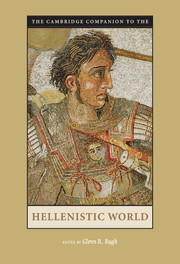Book contents
- Frontmatter
- Introduction
- 1 Alexander the Great and the Creation of the Hellenistic Age
- 2 The Hellenistic Kingdoms
- 3 The Polis and Federalism
- 4 Hellenistic Economies
- 5 The Hellenistic Family
- 6 History and Rhetoric
- 7 Material Culture
- 8 Hellenistic Art: Two Dozen Innovations
- 9 Language and Literature
- 10 Greek Religion: Continuity and Change in the Hellenistic Period
- 11 Philosophy for Life
- 12 Science, Medicine, and Technology
- 13 Hellenistic Military Developments
- 14 Greeks and Non-Greeks
- 15 Recent Trends and New Directions
- Hellenistic Dynasties
- Works Cited
- Index
13 - Hellenistic Military Developments
Published online by Cambridge University Press: 28 November 2007
- Frontmatter
- Introduction
- 1 Alexander the Great and the Creation of the Hellenistic Age
- 2 The Hellenistic Kingdoms
- 3 The Polis and Federalism
- 4 Hellenistic Economies
- 5 The Hellenistic Family
- 6 History and Rhetoric
- 7 Material Culture
- 8 Hellenistic Art: Two Dozen Innovations
- 9 Language and Literature
- 10 Greek Religion: Continuity and Change in the Hellenistic Period
- 11 Philosophy for Life
- 12 Science, Medicine, and Technology
- 13 Hellenistic Military Developments
- 14 Greeks and Non-Greeks
- 15 Recent Trends and New Directions
- Hellenistic Dynasties
- Works Cited
- Index
Summary
To speak of military developments in the Hellenistic period is to assume that significant changes in warfare or technology justify a separate category called “Hellenistic.” To a great degree, this assumption is false. In fact, the most significant developments in Greek warfare took place in the course of the fourth century. To the world of Dionysios of Syracuse, Iphikrates of Athens, and Philip II and Alexander the Great of Macedonia belong the credit for revolutionizing warfare in the areas of mercenaries, infantry, the use of cavalry, and siege weapons. If we argue, with respect to warfare, that the Hellenistic world begins not at the death of Alexander the Great in 323, but with the accession of his father Philip in 359, then we would be truer to the annunciation of a new age. For the most part, the Greeks continued traditions existing in the Classical period but simply magnified them into what one scholar aptly described as “gigantism”: large professional (mercenary) armies, greater specialization of arms and armor, terrifying machines of war, and huge ships. War was still settled the “old-fashioned way” - by men fighting men on the battlefield, but it was no longer the exclusive province of the citizen army of the Classical polis. Warfare in the Hellenistic period belonged primarily to the professionals and to the technical experts. And it was certainly the business of kings.
- Type
- Chapter
- Information
- The Cambridge Companion to the Hellenistic World , pp. 265 - 294Publisher: Cambridge University PressPrint publication year: 2006
- 9
- Cited by

